- Home
- Brian Lumley
In the Moons of Borea Page 7
In the Moons of Borea Read online
Page 7
'We — yes — of course! Did you really think I'd let you go adventuring in the moons of Borea on your own?' And the Warlord laughed and slapped his thigh. 'Now come on, we've one or two things to attend to.'
PART TWO : NUMINOS
1 In the Eye of the Twister
Apart from the two heavily wrapped figures standing dead centre of the flat, frozen roof of the plateau, that elevated expanse was empty. No watchmen stood behind the low parapet walls; no sightseers gazed out over the white waste; nothing stirred but flurries of snow and rime blown about by stray gusts of wind. All well-wishers had departed minutes earlier — Tracy Silberhutte and, Jimmy Franklin, Charlie Tacomah the Elder, Oontawa the handmaiden, and her man Kota'na, Keeper of the Bears, these and many others — alt retired now and gone down into the safety of the plateau where the Great Wind would not touch them.
The fires that warmed the perimeter walls had been extinguished hours ago; all openings in the plateau's face were now glazed over with thick sheets of ice formed by pouring water over them, necessary in view of the tremendous suction Armandra's tornado would create; all inhabitants and denizens were safely within their caves, quarters, and stables, and the snow-ships were anchored and tied down deep 'in the recesses of their keeps. The two men on the roof, attached each to the other by a new double harness hurriedly manufactured by the plateau's saddlers, waited for Armandra.
She, too, had said her farewells, coming to the roof to hug de Marigny fiercely and kiss her Warlord tenderly, then departing to meditate for a few minutes alone in her apartments. Now they both waited for her and watched the rim of the plateau to the south. She would appear there, floating free on the wind as she drifted up into sight. Then she would stand off from the face of the plateau, rising high into the sky before calling up the mighty whirlwind which would thrust the two adventurers across the vast gulf of space to the moons of Borea.
And now she came — Armandra, the Woman of the Winds — dressed all in white but aglow with a carmine flush that radiated outward from her perfect form as a visible aura. Her hair swayed lazily above her head, floating to and fro in eerie undulations as she rose up in awesome grandeur. Her arms were held loosely at her sides and her loose fur robes floated about her almost as if she were suspended in some slow liquid. Then, still facing them, she receded, moved out over the white waste, lifted up her arms shoulder high, and commenced a series of summoning motions with her long white hands. At this distance her body formed a small cross of carmine fire in the suddenly darkening sky — a cross that commanded incredible powers.
Mastery of all the elementals of the air — of the winds themselves — and in her father's absence, not even the most wayward wind might defy her!
Starting far out beyond Ithaqua's totem temple and hidden from the view of the adventurers on the roof by the horizon of the plateau's rim, the surface snow and rime began to stir in agitated flurries. Rapidly, forming a circle fifteen miles across that encompassed the plateau centrally, small white spirals marched on the plateau, closing their ranks and towering higher as the circle narrowed. The line, high now as Ithaqua's ice pyramid, swept across the area of the totem temple. Several totems were uprooted like matchsticks and tossed aside, and the snow wall marched on unhindered.
Finally the sky itself began to revolve, a sea of darkly churning thunderheads all moving together, turning like a great wheel on spokes of boiling cloud. As the speed of this fantastic aerial phenomenon picked up; the two adventurers gazed dizzily skyward, reeling together while the plateau's roof seemed physically to turn beneath their furbooted feet. Now, too, they could hear the rush of air, the howling of the white wall as it thundered toward them; and at last its crest could be seen towering higher than the rim of the plateau.
Until now the wall had been formed of many individual snow devils, tornadoes in the making, but now these small twisters had begun to move to match the motion of the sky, had lost their individuality as they formed a single massive funnel that reached higher by the second, twisting into a whirling, swaying corkscrew shape that began to shut out the light as surely as any wall of bricks and mortar.
There came a roaring as of a tidal wave breaking on a headland . . . and instantly the massive funnel reared taller, reaching up to shut out all but a dim grey light. The tornado had climbed the walls of the plateau, was now narrowing down its diameter on the roof itself with the plateau as a base. To the many watchers who braved the winds that still roared about Ithaqua's totem temple, it seemed almost that the giant twister was an extension of the plateau, the stem of some incredible white-boled tree that swayed and writhed and went up forever; for indeed its top could no longer be seen but transcended the limits of human vision as it snaked out into the void, bending toward Borea's moons.
And within a great circle that had the plateau for its centre, covering an area of almost a thousand square, miles, the winds still fought and tore, shrieking as they rushed in to support the incredible column, to push it higher still, driving its corkscrew tip across the otherwise empty void. Now the adventurers felt the first tug of trembling air in the all but still centre of the uproar — now their persons were explored by gently curious tendrils of air, caressed by scarcely definable fingers — now the flying cloak belled out about de Marigny's shoulders and he felt an upward tugging that bade fair to lift him with or without the cloak's assistance.
`Armandra's personal familiars,' Silberhutte shouted above the howl of frenzied air. 'Fair winds to protect us across the void, Henri. Now we can go. Give us maximum lift, or whatever it is you do, and let's get on our way.'.
`When I tell Titus Crow about this,' de Marigny began as he urged the cloak gently skyward until the Warlord swung beneath him in the dual harness, 'if ever I get to tell him, that is, he'll never . . . My God!' De Marigny's exclamation burst from him when, as if suddenly released like a stone from a catapult — or, as Silberhutte had put it, 'a bullet down the barrel of a rifle' — the cloak and its passengers were shot aloft.
Up they went, ever faster, while the inner surface of the whirling white wall closed on them until it was only fifty feet or so away on all sides. And yet they felt no pressure, no friction or whipping of outraged air, for Armandra's familiar winds held them fast in a protective bubble that travelled with them. They saw flashing past them the dizzy wall like the flue of some cosmic chimney, and they heard the deafening bellow of banshee winds, but all they felt was the awesome, crushing acceleration as they plummeted ever faster up the eye of the tornado.
`He'll ... never . . . believe me!' de Marigny finally finished with a whisper that went unheard in the mad tumult. Teeth gritted, flesh straining as the acceleration built up, the two clung desperately to their harnesses while the tube of insanely spiralling air became merely a blur, no longer white but a dark shade of grey rapidly turning black.
For Borea was far behind now and even the softly luminous auroral shades of this alien dimension's interplanetary void were shut out, excluded by the nearly solid, twisting, thrusting funnel of frozen air. Then the acceleration was over, and they fell free, weightless, while around them, silent now but working as furiously as ever, Armandra's tornado — that great-grandfather of all tornadoes — blew them toward unknown, unguessed adventures.
After a little while de Marigny's natural apprehension began to abate. The limited atmosphere was bitterly cold but bearable, by no means the icy, killing, frigid hell he would normally have expected of interplanetary space; and while doubtless the surrounding wall of the twister whirled and writhed as before, it could neither be seen nor heard from within, so that all seemed tranquil with no sensation of speed apparent. Nevertheless the travellers knew that they were speeding across space, protected only by Armandra's familiars whose substance formed about them a soft, hurtling bubble of air.
It never occurred to them that they might converse until de Marigny sneezed, but as the staccato echoes of that involuntary ejaculation died away, they recognized at once that conversation was ind
eed possible, moreover that it would help in further dissipating their tension and not unnatural nervousness.
'Would you like to know about Numinos, Henri?' Silberhutte's voice echoed and reverberated loudly within their protective bubble of air. 'It suddenly occurs to me that you know nothing at all about where we're going.'
'Any and everything you can tell me,' de Marigny answered. 'Forewarned, as they say back home, is forearmed.'
`Yes,' the Warlord agreed, 'and armour is something we're pretty short of. An axe apiece, a flying cloak, and — ' He paused.
`And?'
'These winds of Armandra's. Her personal familiars that have looked after her since the day she was born a daughter of that alien, black-hearted monster and a human mother. It worries me now that she's without them. Yet if they were to leave us . . . we'd be dead sooner than it takes to tell! They're ours to command now, until we find the clock, or — '
De Marigny sensed the Warlord's shrug of resignation in the dark, picturing the other floating weightlessly close by in his harness. Then the strangeness of his situation hit him, and he wondered to himself:
'What on Earth — or off it — am I doing here? Sustained by a bubble of sentient air; speeding along on a mad voyage between alien worlds; questing after a stolen space-time machine so that I can go off adventuring again in search of Elysia? Is there any such place as Elysia, I wonder, or am I simply another patient in a madhouse somewhere? A hopeless case that the doctors despair of, keeping him quietly sedated in his own lunatic world of opium dreams . .
'Numinos,' Silberhutte finally continued, 'though the closest of the moons of Borea, is also a world in its own right — a world like many others, with an atmosphere, oceans, and people. On one of the largest islands dwells the principal race, sailors with a warrior instinct, worshippers of Ithaqua. From what Armandra has told me of them, it's perfectly natural that they should worship the Wind-Walker; their ancestors most certainly deified Odin and Thor in the Motherworld. Yes, they are Norsemen or as nearly Vikings as makes no difference. They control and inhabit all of the Numinosian islands except one: the Isle of Mountains.
'In the Isle of Mountains dwells a peace-loving race, not Ithaqua's people, protected in some way from the periodic attacks of the seafaring barbarians. There aren't many of these peaceful folk — a few families, a handful — but Ithaqua's interest in them has always been intense, and never more than right now. I don't know why . .
As the Warlord paused, de Marigny inquired: 'But how does Armandra know all of these things? Has she herself visited the moons of Borea?'
In the absolute darkness Silberhutte answered, 'No, but when she was a child — through all the years when the Elders were grooming her for her role as the plateau's first citizen — often Ithaqua would try to tempt her away from her tutors. He'd send her telepathic pictures of the secret places he knew, the distant, strange worlds where he is worshipped, feared, hated. Then, as now, he desired a companion to walk with him on the winds that blow between the worlds. Remember, Henri, that his is a loneliness lasting for aeons.
'At any rate sometimes these mental invasions of Ithaqua's upon his daughter's privacy were vivid and detailed. Particularly on those occasions when he told her of the relatively close dominions of Numinos and Dromos, worlds he was wont to visit whenever he returned to Borea from his immemorial wanderings.
`But however persuasive the monster's promises, however seductive his telepathic enticements, the Elders had brought the child up to loathe him, showing her his cruelties at every opportunity. And gradually, as she grew through her teens into womanhood, her father's tempting slackened off. After all, it must have been a great strain on him even on the Wind-Walker to carry on this prolonged attempt at Armandra's mental seduction, the ultimate goal of which was to be her defection from the plateau and its peoples. For you see, the plateau with its subterranean store of star-stones has always been anathema to him, and to force his mind in upon hers through barriers such as those laid down by the Elder Gods must have been psychic agony. And all to no avail, for she spurned him totally.
'His final disappointment must have been when she and I joined forces, when we took each other as man and wife; for it was then that she fought him with his own powers, inherited from him, and would have destroyed him with them if she could. Oh, yes, he must have realized then that she was a lost cause, that he could never hope to win her to him. I think that if ever he is given the chance, he will kill her. Certainly he would kill me — and, judging from what you've told me, he'd kill you, too, without hesitation.'
As Silberhutte talked, his companion noticed what appeared to be a gradual lightening effect; the utter blackness became shot with dark grey streaks, and the whole began to take on an opaquely milky appearance:
`Hank,' de Marigny called out. 'I think something is happening — or do I only imagine it?'
After a slight pause the Warlord answered: 'No, it's real enough, Henri. It could mean that we've reached the end of our ' Abruptly, breathlessly, he again paused, then cried, 'Look!
At Silberhutte's excited exclamation the surrounding milkiness rapidly took on rushing motion. One second all seemed calm and silent, the next brought a resumption of the tornado's chaotic whirling; and as a dim light illuminated the two voyagers, they saw that the wall of the twister had finally extended itself to its limit, that it now whirled about them within arms' reach!
In another moment gravity returned, and with it the knowledge that they were now falling headlong down the narrow tube that was the whirlwind's centre. Sound, too, rushed in upon them from outside: a furious high-pitched whining that had them clapping hands to ears and gritting their teeth as the pitch rose higher with each passing second.
Then -
- The whirling wall was gone, disintegrating as at the touch of some magical wand, flying apart when Armandra, a world away on Bores, released her control over it. The mighty whirlwind was finished, done, its debris filling the higher atmosphere of Numinos as fine snow. And down through that rapidly dispersing cloud of ice particles, their ears still ringing with the sounds of the great twister's death cries, down from a height of something less than two miles plummeted the men who had ridden a tornado from one world to another.
Head over heels in a knot of leather, fur, and chill flesh they fell, the cloak wrapped about them like some tangled parachute. And yet even as their fall began, it was partially arrested; they found themselves buoyed up and stabilized by Armandra's familiar winds, those same semisentient elementals of the air whose life-support bubble had protected them across twenty thousand miles of interplanetary space.
Now, falling feet first and at a vastly reduced velocity, the two men quickly disentangled themselves, and de Marigny cautiously took control of the flying cloak. As that garment of the Elder Gods took their weight, they felt a momentary tightening of their harnesses, followed by the sensation of sustained, controlled flight.
The cloak belled out above and behind them like the membrane wings of some great bat, and down they swept toward the surface of Numinos far below . .
2 The Vikings
The descent of the cloak and its passengers to the surface of Numinos was in itself a voyage of discovery. De Marigny soon noted that the cloak was flying with an efficiency never before experienced under the burden of a dual load. He attributed this fact to the low Numinosian gravity, which was about three-quarters that of Borea. He was also struck by the beauty of this strange moon whose far face, like that of Luna, had never been seen from the parent world and should therefore be cold, dark, and foreboding. Indeed away on the horizon great blue cliffs of ice reared like a mountain chain that stretched as far as the eye could see, and in the ocean vast icebergs drifted down from the frozen regions.
As for the Warlord: he was delighted to observe that Borea and her moons did after all have a sun of sorts, one perhaps not too greatly at odds with Earth's own. Away beyond the World of the Winds, which hung huge, grey-green, and ominously clouded in th
e sky, the pink and yellow orb of the luminary Silberhutte had always suspected, showed more than half its disk, shooting out bursts of golden auroral streamers that flowed into the void, slowed, and were rapidly drawn back into the furnace heart,
`A sun!' Silberhutte cried once more. 'Which means that Borea's far side is probably a paradise. Armandra never knew of the sun's existence, has never physically seen it, and her father seems to have taken good care never to let her see it through his mind. I'm willing to bet that lthaqua is confined to Borea's frozen regions just as surely as he is to the Arctic Circle and its boundaries
on Earth. If I'm right . . . do you know what it means? One day the monster may return from his wanderings to find the plateau deserted and its tribes flown the coop to tropical lands beyond his reach.' look down there,' de Marigny called out by way of an answer. 'Many of those islands appear to be volcanic. Is that or is it not a huge hot-water geyser?'
They were passing directly over a cluster of small islands as they headed for a greater land mass some miles distant. Close to one island a great spout of water belched up intermittently, emitting clouds of steam and boiling yellow gasses. High as they were above this phenomenon, nevertheless they smelled sulphur in the otherwise pure Numinosian air.
`Volcanic, yes,' Silberhutte agreed. 'I've seen and smelled much the same in the Motherworld — that is to say, on Earth. Look over there, on the horizon to our right. If that isn't a full-blown volcano, I've never seen one . .
But now something else spouted in the calm, gold-glittering sea half a mile below — many somethings — and in unison the two men cried: 'Whales!'
`Will you look at them, Hank!' de Marigny yelled. 'They're Great Blues, surely?'

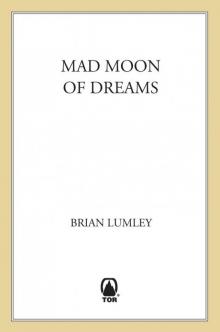 Mad Moon of Dreams
Mad Moon of Dreams Psychosphere
Psychosphere Haggopian and Other Stories
Haggopian and Other Stories Resurgence_The Lost Years_Volume Two
Resurgence_The Lost Years_Volume Two Necroscope: Harry and the Pirates: And Other Tales From the Lost Years
Necroscope: Harry and the Pirates: And Other Tales From the Lost Years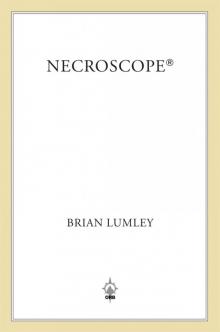 Necroscope®
Necroscope® Dreamlands 5: Questers for Kuranes: Two Tales of Hero and Eldin
Dreamlands 5: Questers for Kuranes: Two Tales of Hero and Eldin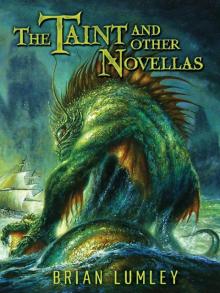 The Taint and Other Novellas: Best Mythos Tales Volume 1
The Taint and Other Novellas: Best Mythos Tales Volume 1 Necroscope: Defilers
Necroscope: Defilers Beneath the Moors and Darker Places
Beneath the Moors and Darker Places The Fly-By-Nights
The Fly-By-Nights Khai of Khem
Khai of Khem Ship of Dreams
Ship of Dreams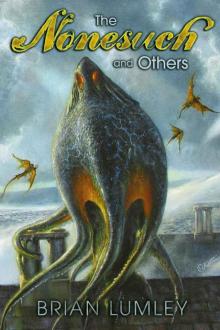 The Nonesuch and Others
The Nonesuch and Others Blood Brothers
Blood Brothers Necroscope
Necroscope The Burrowers Beneath
The Burrowers Beneath Bloodwars
Bloodwars No Sharks in the Med and Other Stories
No Sharks in the Med and Other Stories The House of Doors - 01
The House of Doors - 01 Screaming Science Fiction
Screaming Science Fiction Necroscope III: The Source
Necroscope III: The Source Vampire World I: Blood Brothers
Vampire World I: Blood Brothers Iced on Aran
Iced on Aran Necroscope: Invaders
Necroscope: Invaders Necroscope: The Lost Years
Necroscope: The Lost Years Return of the Deep Ones: And Other Mythos Tales
Return of the Deep Ones: And Other Mythos Tales Necroscope V: Deadspawn
Necroscope V: Deadspawn Titus Crow, Volume 3: In the Moons of Borea, Elysia
Titus Crow, Volume 3: In the Moons of Borea, Elysia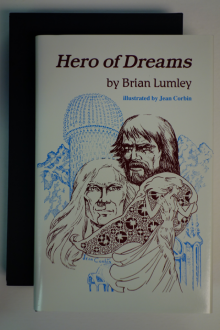 Hero of Dreams
Hero of Dreams Necroscope IV: Deadspeak
Necroscope IV: Deadspeak The Last Aerie
The Last Aerie The Second Wish and Other Exhalations
The Second Wish and Other Exhalations Necroscope: The Touch
Necroscope: The Touch Necroscope: The Plague-Bearer
Necroscope: The Plague-Bearer Necroscope: Avengers
Necroscope: Avengers Necroscope II: Wamphyri
Necroscope II: Wamphyri Necroscope II_Vamphyri!
Necroscope II_Vamphyri! A Coven of Vampires
A Coven of Vampires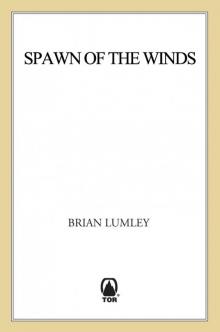 Spawn of the Winds
Spawn of the Winds Sorcery in Shad
Sorcery in Shad Deadspawn
Deadspawn Necroscope V: Deadspawn n-5
Necroscope V: Deadspawn n-5 Necroscope: Invaders e-1
Necroscope: Invaders e-1![Beneath the Moors and Darker Places [SSC] Read online](http://i1.bookreadfree.com/i/03/20/beneath_the_moors_and_darker_places_ssc_preview.jpg) Beneath the Moors and Darker Places [SSC]
Beneath the Moors and Darker Places [SSC]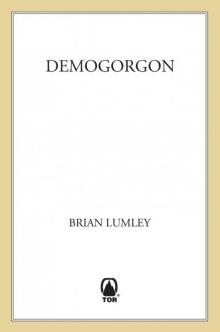 Demogorgon
Demogorgon Harry and the Pirates_and Other Tales from the Lost Years
Harry and the Pirates_and Other Tales from the Lost Years Necroscope IV: Deadspeak n-4
Necroscope IV: Deadspeak n-4 Deadspeak
Deadspeak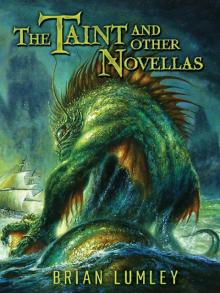 The Taint and Other Novellas
The Taint and Other Novellas Blood Brothers vw-1
Blood Brothers vw-1 The Source n-3
The Source n-3 In the Moons of Borea
In the Moons of Borea Avengers
Avengers Necroscope n-1
Necroscope n-1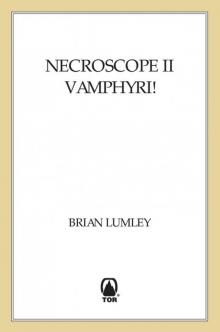 Vamphyri!
Vamphyri! Questers for Kuranes: Two Tales of Hero and Eldin
Questers for Kuranes: Two Tales of Hero and Eldin Necroscope II: Wamphyri! n-2
Necroscope II: Wamphyri! n-2 The Source
The Source Elysia
Elysia The Plague-Bearer
The Plague-Bearer The Touch
The Touch Invaders
Invaders Necroscope 4: Deadspeak
Necroscope 4: Deadspeak Compleat Crow
Compleat Crow The Mobius Murders
The Mobius Murders Defilers
Defilers